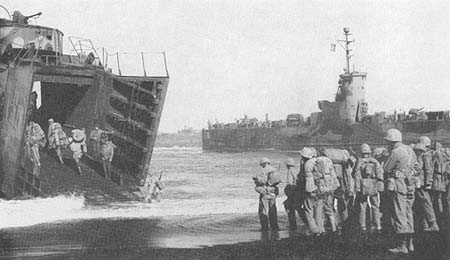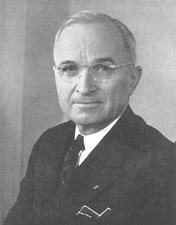 |
jacklummus.com Home Page Search Contact Us Site Map
Click the <Back> arrow to return to the previous page.
Awarding a Medal of Honor
 |
On March 26, 1945 at 0800 Major General Harry Schmidt, Commander of the Fifth Amphibious Corps, declared the operation completed thus ending the Marine Corps' combat presence in the Battle of Iwo Jima. He closed his command post, and withdrew from the island on the afternoon of the 26th. The following day troops of the 3rd Marine Division trudged to the east beach, and embarked aboard landing crafts that would take them to waiting transports followed by troops of the 4th and 5th Marine Divisions. After 36-days and almost as many nights of bitter fighting against General Kuribayashi's subterranean garrison ensconced in a near impregnable fortress, and their job finished, Fifth Amphibious Corps abandoned the malevolent little island to the U.S. Army.
On March 26 Major General James Eugene Chaney, U.S. Army Air Force, became Commander of all U.S. Forces on Iwo Jima. He had arrived with his headquarters and the U.S. Army's 147th Infantry Regiment off the coast of Iwo Jima on February 27. The 147th commenced landing on March 21, the day the 5th Marine Division Cemetery was formally dedicated. Over the next five-days, Marine combat units were pulled out of the line or secured from missions as the 147th took over garrison duty, and organized a systematic mop-up of scattered remnants of Kuribayashi’s troops. The overlapping of Marines and Army gave the 147th the necessary time to learn, from the Marines, the peculiar methods that had been developed to meet enemy tactics.
The South (No.1) and Central (No. 2) airfields were
operational, and on April 3 the Seabees began work on the North Field
(unfinished Airfield No. 3).
A long awaited change in the optimum altitude from which B-29s could bomb Japan was ushered in on April 7 when 100 P-51 fighters rose from the dusty runways on Iwo Jima to escort B-29 Superforts flying from the Marianas to Japan. Bombing runs from the Marianas began on November 24, 1944, but their efficiency was hampered by the absence of fighter escorts, which made it necessary to release payloads from 30,000 feet. With fighter escorts, raids could be conducted from a more precise bombing elevation of 10,000 feet doubling the efficiency of the B-29s lifting off runways on Tinian, Saipan and Guam.
Before hostilities with Japan ended, approximately 2,400 damaged B-29s carrying crews of approximately 27,000 men made emergency landings on runways on Iwo Jima. Air-sea rescue planes based on the island saved many crews of many planes forced to land at sea. Iwo Jima was all that Nimitz had said it would be in American hands, and more.
Aboard transports steaming from Iwo Jima eastward to Eniwetok then Hawaii and Camp Tarawa, officers were immersed in an ocean of paperwork. Action reports were being written to describe every phase of the operation. Plans were being drawn up for an orderly return of men and equipment of the 5th Marine Division to Camp Tarawa. Rehabilitation programs and training schedules for the assault on Japan (Operation Olympic) were being written and finalized in a timely manner. But, one of the more difficult and soul-searching tasks facing officers were recommendations for decorations and awards for their men. Admiral Nimitz predicted the difficulty of this task on March 17 when he said, "On Iwo Island, uncommon valor was a common virtue."
Ships with 5th Division Headquarters, and troops of the 28th Marines were the first to reach Hilo Harbor. They arrived and disembarked at Hilo docks on April 12. Men and equipment moved over available routes the 65-miles to Camp Tarawa. The 26th and 27th Marines, with attached units, took anchorage at Pearl Harbor, where all men had liberty ashore, and followed on the heels of the 28th Marines to Camp Tarawa. Once in camp, reality put emotions on a roller coaster accompanied by guilt bore by those who lived. They pondered the puzzling question of why they lived and others died. Ernie Pyle explained it simply when he wrote, "They died and others lived and nobody knows why it is so."
Shortly
after reaching Camp Tarawa, Major John William "Tony" Antonelli, Commanding Officer of 2nd
Battalion, 27th Marines, 5th Marine Division began the process of gathering statements
from witnesses, and all relevant information necessary to reconstruct the reported
valor in combat of 1st Lt. Jack Lummus on March 6-8, 1945, and in particular the
8th. Major Antonelli was considering recommending Lt. Lummus for the Medal of Honor.
On
April 19, 1945 Captain Thomas A. Bruns, Commanding Officer of Company B, 5th
Tank Battalion, 5th Marine Division, submitted his statement validating Jack's
valor on March 8 to Major Antonelli. Captain Bruns witnesses Jack's
participation in the fighting on the morning of the 8th. Company B, 5th Tank
Battalion had been ordered to support 2nd Battalion, 27th Marines. Jack with a
handful of men from 3rd Platoon, Company E, under heavy enemy fire, guided Captain Bruns' Sherman tanks over rough
terrain to where their support was
needed.
On April 22 statements were taken from Privates First Class Peter Pavich, Alfred O'Banion, Jr., and Jerry Sezpanik. These were men who served under Jack in 3rd Platoon, Company E, and witnessed his participation in the fighting on the 6th-8th. Their written statements validated Jack's valor on March 8. Each statement was witnessed by 1st Lt. Gordon C. Daniels.
On
April 22 Major Antonelli forwarded his recommendation with summary and
enclosures ([A] Sample citation, [B] Statement of Captain Thomas A. Bruns, and
[C] Statement of witnesses) to the Secretary of the Navy through established
military channels beginning with The Commanding Officer, 27th Marines. A
written and signed statement by Major John P. Salmon, Commanding Officer of
Company E, 2nd Battalion, 27th Marines was missing from the enclosures. Major
Salmon had been wounded and evacuated, and unavailable to sign a written
statement, but gave a verbal statement further validating Jack's valor on March
6-8, 1945.
The subject of Major Antonelli’s summary was, "Award of the Congressional Medal of Honor, recommendation for, case of First Lieutenant Jack Lummus, U.S. Marine Corps Reserve, deceased."
Major
Antonelli wrote in paragraph one of his summary, "It is recommended that
First Lieutenant Jack Lummus be considered for award of the Congressional Medal
of Honor for distinguishing himself in action against the enemy on Iwo Jima,
Volcano Islands on 8 March, 1945."
On April 26 Colonel Thomas A. Wornham, Commanding Officer of 27th Marines, signed and forwarded the 1st Endorsement to The Commanding General, 5th Marine Division. Colonel Wornham wrote, "This decoration has been recommended to me by a Regimental Board of Awards and I concur fully with the remarks as set forth in the basic letter and the proposed citation."
On May 17 Major General Keller E. Rockey, Commanding General, 5th Marine Division, signed and forwarded the 2nd Endorsement to The Commanding General, Fifth Amphibious Corps. General Rockey wrote, "Forwarded, recommending award of the Congressional Medal of Honor."
On June 12 Major General Harry Schmidt, Commanding General, Fifth Amphibious Corps, signed and forwarded the 3rd Endorsement to The Commanding General, Fleet Marine Force, Pacific, with a copy of the 3rd Endorsement to Major General Keller E. Rockey. General Schmidt wrote, "Forwarded, recommending the posthumous award of the Congressional Medal of Honor."
On July 10 Lieutenant General Roy S. Geiger, Commanding General, Fleet Marine Force, Pacific, signed and forwarded the 4th Endorsement to The Commander in Chief, U.S. Pacific Fleet and Pacific Ocean Areas with a copy of the 4th Endorsement to Major General Keller E. Rockey. General Geiger wrote, "Forwarded, recommending the award of the Medal of Honor, posthumously, to First Lieutenant Lummus as a suitable decoration for the act cited."
On August 6 O. L. Thorne, by direction of the Commander in Chief, U.S. Pacific Fleet and Pacific Ocean Areas, signed and forwarded the 5th Endorsement to the President, Pacific Fleet Board of Awards. The 5th Endorsement read, "Forwarded for consideration, recommendation and return of all papers."
On August 6 Rear Admiral William H. P. "Spike" Blandy, President, Pacific Fleet Board of Awards, signed and forwarded the 6th Endorsement, with all papers, to the Commander in Chief, U.S. Pacific Fleet and Pacific Ocean Areas. Admiral Blandy wrote, "Returned after having been reviewed by the Board at a meeting held this date. The Board recommends that the following award be made: Congressional Medal of Honor to 1st Lt. Jack Lummus, USMCR (Posthumous)."
On August 19 Admiral Chester W. Nimitz, Commander in Chief, U.S. Pacific Fleet and Pacific Ocean Areas, signed and forwarded the 7th Endorsement to The Commandant of the Marine Corps with copies of the 7th Endorsement to Lieutenant General Roy S. Geiger and Major General Keller E. Rockey. Admiral Nimitz wrote, "The Commander in Chief, U.S. Pacific Fleet, recommends that the Congressional Medal of Honor be awarded, posthumously, to First Lieutenant Jack Lummus, U.S. Marine Corps Reserve."
On August 31 General A. A. Vandegrift, Commandant of the Marine Corps, signed and forwarded the 8th Endorsement to the Secretary of the Navy via the Navy Department Board of Decorations and Medals. General Vandegrift wrote, "Forwarded, recommending that First Lieutenant Lummus be awarded the Medal of Honor, posthumously."
On September 6 R. W. Hayler, Navy Department Board of Decorations and Medals, signed and forwarded the 9th Endorsement to the Commander in Chief, United States Fleet and Chief of Naval Operations with a copy to the United States Marine Corps Board of Decorations and Medals. R. W. Hayler wrote, "The Board concurs with the seventh endorsement from the Commander in Chief, U.S. Pacific Fleet, and recommends the posthumous award of the Medal of Honor to First Lieutenant Jack Lummus, U.S. Marine Corps Reserve, in recognition of his extraordinary heroism in combat on 8 March 1945 during the reduction of Iwo Jima."
On September 14 Admiral Ernest J. King, Commander in Chief, United States Fleet and Chief of Naval Operations, signed and forwarded the 10th Endorsement to the Secretary of the Navy. Admiral King wrote, "I concur in the recommendation that the Medal of Honor be posthumously awarded to Jack Lummus, First Lieutenant, USMCR, in recognition of his outstanding heroism as set forth in basic letter."
On September 18 Artemus L. Gates, Acting Secretary of the Navy, approved the subject, "Award of the Congressional Medal of Honor, recommendation for, case of First Lieutenant Jack Lummus, U.S. Marine Corps Reserve, deceased."
Following approval by the Secretary of the Navy, a memorandum with enclosure was forwarded to the Naval Aide to the President. It read, "It is requested that the enclosed Medal of Honor Citation for the late First Lieutenant Jack Lummus, United States Marine Corps Reserve, be signed by the President."
 |
On May 5, 1946 Harry S. Truman, President of the United States, signed the Citation awarding posthumously the Medal of Honor to First Lieutenant Jack Lummus.
On
Memorial Day, Thursday evening, May 30, 1946, in a Memorial Service at Ennis,
Texas under the auspices of the American Legion and Auxiliary, Mrs.
Laura Francis Lummus received the Medal of Honor awarded to
her son, First Lieutenant Jack Lummus. Presenting the nation's highest award in
the name of the Congress of the United States was Rear
Admiral Joseph James "Jocko" Clark.
Click the <Back> arrow to return to the previous page.
© 1999-2007 Utility Press Inc. All rights reserved. Copyright claim exclusive of photograph.